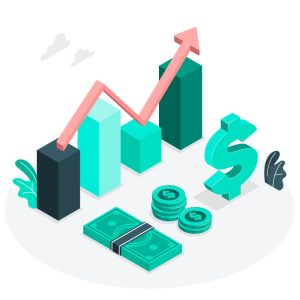Outlook for venture capital in 2022
The accelerated digital transformation caused by the response to the pandemic coupled with an economic reopening has invigorated the innovation economy through 2021. Venture capital is enjoying a boom like never seen before. As we look into 2022, what lies in store for venture capital, and what are the storm clouds on the horizon?
In 2020 and 2021, the COVID-19 pandemic caused disruption in every aspect of how we live, work and play. By April 2020, GDP data for the United States and Europe confirmed that a global recession had arrived. The economy was ground to a halt, and investment and exit activity stopped. As the spring turned into summer in 2020, the engine of venture capital restarted, and funds poured billions into digital transformation, the metaverse and fourth industrial revolution technologies.
Image Credits: Pexels.com
As we look toward a new start as well as a new normal, we’re reminded by historical events that deals struck in times of crises can bring huge returns. With 2022 just around the corner and recovery in full swing, the critical lessons that history taught us should inspire positivity for venture capital firms and entrepreneurs around the globe, while storm clouds gather for a potential correction.
The pandemic created the most extensive financial stimulus plan the world has ever seen. The economic turmoil was ultimately caused by a forced shutdown of a global movement of people and commerce to contain the virus. Other post-World War II recessions were triggered instead by fiscal challenges. For China, the U.S., Europe, Japan, and the U.K., total deficits will go beyond 1.5x levels seen after the great recession of 2008-2009.
Despite the pandemic, the venture capital asset class has demonstrated extraordinary levels of both activity and paper gains. The venture capital asset class has grown far beyond seed- and early-stage funds, with public and hedge fund investors dipping into the private markets to get their hands on late-stage “unicorns” (private companies valued at greater than one billion dollars). These unicorns were valued by venture capitalists using comparable company transactions and multiples of financial results from public companies and applying them to the private markets. Dipping into these markets for alpha, the results were driven higher by other venture capital firms, sovereign wealth, hedge, and mutual funds.
As the global economies reopen, more people return to work and return to travel, production levels are improving, and demand is outpacing supply. We will likely see more action in the capital markets, as private companies take advantage of the open IPO window to get public.
As we approach 2022, the economy continues to attract workers back into the economy after a long hiatus. Venture capital firms Andreesen Horowitz, Sequoia and others have announced massive new funds, and in the latter case, a new model to maintain constant fundraising capabilities in both the private, public and crossover markets. With large amounts of capital to deploy at their disposal, venture capital funds should continue to fuel the innovation economy. Although there is still some uncertainty as the pandemic continues, the amount of dry powder is reason in and of itself for optimism and positivity.
Image Credits: Freepik.com
The risk of decline to the venture capital no longer relates to the pandemic itself, but to supply chain blockages and shortages, increased government regulation, dangers of inefficient stimulus dollars that stop employees from returning to the workforce, inflationary risks, potential ensuing interest rate hikes, and finally, big tax increases to pay for the stimulus.
In the first year of any new administration, it takes time for the President to make appointments and have them approved by Congress, for newly appointed regulators to appoint key staff members that are aligned with new objectives and for new budgets to be drafted, voted upon and implemented.
The new Federal Trade Commission, for example, has announced policy initiatives that could have lasting impact on the technology industry, including scrutiny of new mergers and acquisitions, legacy transactions (even those below the reporting threshold), and actions to break-up perceived monopolies.
If the government seeks to break up existing technology companies, new investment could stop until the dust settles. If it seeks to stop the engines of growth, how will “bigtech” companies innovate from the inside or acquire the teams of engineers necessary for new product development? If acqui-hires of startups by bigtech are frozen, will venture capital firms still be willing to invest in seed- and early-stage ventures?
Looking at the legislative and fiscal side of things, Congress has announced proposals to squelch the qualified small business stock exemption from capital gains taxes, with large increases in capital gains and ordinary income rates. Whether or not the carried interest survives will have fundamental impacts on returns for sponsors of venture capital funds, further compounded by the aforementioned rate increases and expiration of QSBS. Innovation is a risky business. If there is no risk premium, expect less investment.
The future for venture capital indeed looks bright for 2022, but there are storm clouds gathering on the horizon.
Connect with Louis Lehot:
Website: Louis Lehot
LinkedIn: Louis Lehot
Facebook: Louis Lehot
Twitter: Louis Lehot
Instagram: Louis Lehot
YouTube: Louis Lehot
Vimeo: Louis Lehot
Pinterest: Louis Lehot
Crunchbase: Louis Lehot
Muckrack: Louis Lehot
Anchor.fm: Louis Lehot
Ideamensch: Louis Lehot
Chief Executive: Louis Lehot
Data Driven Investor: Louis Lehot
Good Men Project: Louis Lehot
Speaker Hub: Louis Lehot
Read the Articles written by Louis Lehot:
Louis Lehot: What to expect for seed and pre-seed stage financing in 2021
Louis Lehot: A Brief Legal Guide To Buying And Selling Shares Of Private Company Stock
Louis Lehot: The IPO Markets Are Changing, And So Is The Lock-up Agreement
Louis Lehot: What are SPACs, and how they are different from IPOs?
Louis Lehot: L2 Counsel Represents AgTech Leader FluroSat In Dagan Acquisition
Louis Lehot: Considering Selling Your Company? Be Clear on Your Fiduciary Duties
Louis Lehot: Incentivizing With Stock Options: What Your Startup Needs To Know About ISOs, NSOs And Other Parts Of The Alphabet Soup
Louis Lehot: Ready To Sell Your Startup In 2021?
Louis Lehot: The State Of The Acqui-Hire In 2021: The Good, The Bad, The Why And What’s Next
Louis Lehot: Leaving Your Job? Don’t Forget Your Stock Options…
Louis Lehot: A Short Primer for Startups on Local Labor and Employment Law Compliance
Louis Lehot: How To Clean Up A Corporate Mess
Louis Lehot: Calculating And Paying Delaware Franchise Taxes — Startups Need Not Panic


